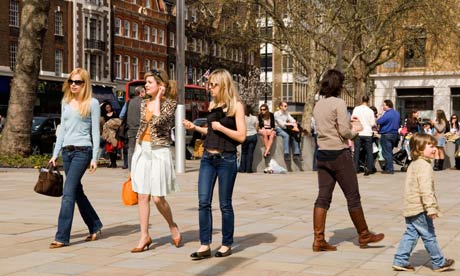
Men in Kensington and Chelsea can expect to live 14 years longer than those in Glasgow, according to figures from the Office for National Statistics (ONS), which reveal a widening gulf in life expectancy between the north and south of the UK.
Women continue to have a longer life expectancy than men, although in some parts of the country the gap between the sexes is narrowing fast. The ONS found that between 2004-06 and 2008-10 the average life expectancy for a female rose by a year to 82.3, while for men it rose by 1.2 years to 78.2.
London has enjoyed the greatest advance in longevity, which the ONS attributed to the relative affluence of many parts of the capital; the movement of healthy, employed individuals to the city; and the statistical effects of migration.
However, the figures reveal huge disparities between the rich and poor parts of the capital. Life expectancy at birth for males in Kensington and Chelsea is 85.1, while for females it is 89.8. But just a few miles away in Lewisham and Newham male life expectancy is less than 77, while for females it is about 81 years.
Glasgow remains the local authority with the worst record on both male and female life expectancy, although it did see a rise from 71.1 to 71.6 for males between 2007-09 and 2008-10.
The figures put the city on a par with life expectancy in Albania and the Palestinian territories, and continue to puzzle health experts. David Walsh, of the Glasgow Centre for Population Health, said much of the blame lies in the history of industrial decline and ingrained deprivation, but this does not explain why Glasgow's figures are so much worse than similar post-industrial areas in the UK.
A study by Walsh found that greater alienation, family breakdown, gender relations and parenting differences, sectarianism, climate, the concentration of deprivation and even genetic factors play a part. Some suspect the city's poor climate and diet affects Glaswegians' vitamin D levels.
Average pay for men in Glasgow in 2010 was £23,356, compared with £87,516 in Kensington and Chelsea.
Glasgow also has remarkably lower life expectancy for males than other areas in Scotland, such as East Dunbartonshire where the figure is 79.4, and Edinburgh where it is 77.2.
The lowest life expectancy for males in England is in Blackpool at 73.6, followed by Manchester at 74.1 and Liverpool at 74.8. In Wales, Rhondda Cynon Taf has the lowest figure at 75.
Meanwhile, every local authority in Buckinghamshire and Surrey reports male life expectancy above 80, except in Woking where it is still a very healthy 79.3.
Life expectancy figures are widely used to inform policy, planning and research in both public and private sectors in areas such as health, population, pensions and insurance.
The TUC's general secretary, Brendan Barber, said the figures were a "stark warning" to a government intent on forcing people to retire later.
"Life expectancy in deprived areas of the UK is increasing at half the pace of the wealthiest parts of London and the south of England," he said.
"People living in areas like Glasgow and Blackpool can expect their retirement to be a decade shorter than those from more affluent parts of the UK.
"Ministers need to realise that rapidly accelerating the state pension age may sound sensible for the wealthy elite in Kensington and Chelsea, but it is a frightening prospect to the millions of people living further north."
This article was amended on 19 October 2011. The original gave incorrect figures for the five lowest areas for life expectancy for both men and women. This has been amended.
Life expectancy for males in years
Highest
Kensington and Chelsea, 85.1
Westminster, 83.8
East Dorset, 82
Elmbridge, 81.8
Crawley, 81.8
Lowest
Renfrewshire, 73.8
Blackpool, 73.6
West Dunbartonshire, 73.6
Inverclyde, 73
Glasgow City, 71.6
Life expectancy for females in years
Highest
Kensington and Chelsea, 89.8
Westminster, 86.7
Hart, Hampshire 86.1
Epsom and Ewell, 86
East Dorset, 85.9
Lowest
Inverclyde, 79.1
Manchester, 79.1
North Lanarkshire, 78.8
West Dunbartonshire, 78.3
Glasgow City, 78

